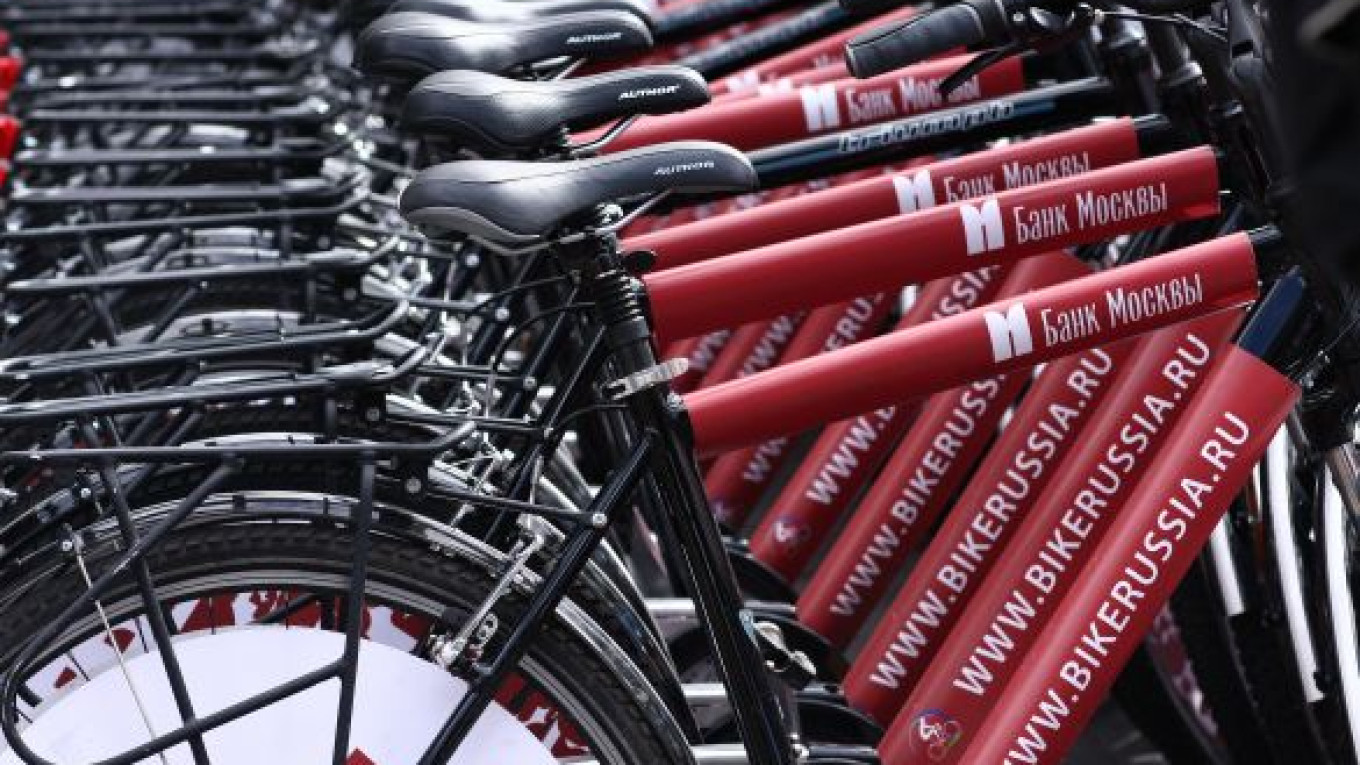The sight of Bank of Moscow president Mikhail Kuzovlyev, along with basketball players from Dynamo Moscow, peddling along the 12-kilometer bike path in Sokolniki Park on Thursday could have given some observers the idea that a celebrity race was in progress.
But in reality, it’s the result of a charitable investment by the bank to improve quality of life in the city and keep its customers longer.
“The body decays, but this biking infrastructure will prolong the lives of our clients, as we want them for many years,” Kuzovlyev said.
Inspired by the shared bike systems in Helsinki, London, Toronto, Stockholm, and Cyprus, the Bank of Moscow partnered with VeloRussia to set up free rental stations for use within parks across Moscow, which it unveiled in Sokolniki Park on Thursday.
A total of six rental points are located in the Gorky, Sokolniki, Filyovsky, Vorobyovy Gory and Tushino parks. A bike can be rented for an hour and a half, with a deposit of 2,000 rubles ($62). Two hundred bikes have been placed in total.
In Sokolniki Park, bike stands are in the shape of a red, capital M. ?€?It?€™s indirect marketing,?€? said Sergei Gorbatov, President of the Association of Bike Infrastructure, as one does not notice the bank?€™s emblem instantly.
The Moscow City Department of Education is also planning to work with the bank to build similar bike parking near high schools to prevent individuals from chaining bikes to fences and other public property.
The parking station in Sokolniki Park cost about 100,000 rubles for 15 stands, which fit 30 bicycles.
The set-up in Sokolniki could pave the way for bike sharing projects across Russia. Sochi plans to open an electronic sharing service by April 2013. The city has partnered with the telecommunications giant MegaFon and Bank of Moscow. Eleven stations and 350 bikes are to be set up. Plans for St. Petersburg and Krasnodar are also in the works.
Moscow City Hall is also toying with the possibility of implementing a free bike sharing system where credit cards are used for the deposit. Due to tension between bikers and drivers, there are plans for approximately 70 kilometers of new lanes to be built, though there is no official confirmation. A public-private partnership with the Bank of Moscow has also been discussed, in which the infrastructure costs would be covered by the government and the operational costs by the bank.
Registration for users would be carried out online, or through subcontractors such as hotels, restaurants and movie theaters.
Three million euros would be enough to run a sharing project in a city for two years, Gorbatov said. The cost includes bike repairs, 25 fixed stations across Moscow, and 1,000 bikes. Bike lanes are excluded from the estimation.
Related articles:
A Message from The Moscow Times:
Dear readers,
We are facing unprecedented challenges. Russia's Prosecutor General's Office has designated The Moscow Times as an "undesirable" organization, criminalizing our work and putting our staff at risk of prosecution. This follows our earlier unjust labeling as a "foreign agent."
These actions are direct attempts to silence independent journalism in Russia. The authorities claim our work "discredits the decisions of the Russian leadership." We see things differently: we strive to provide accurate, unbiased reporting on Russia.
We, the journalists of The Moscow Times, refuse to be silenced. But to continue our work, we need your help.
Your support, no matter how small, makes a world of difference. If you can, please support us monthly starting from just $2. It's quick to set up, and every contribution makes a significant impact.
By supporting The Moscow Times, you're defending open, independent journalism in the face of repression. Thank you for standing with us.
Remind me later.


